Let's talk about racism in the travel industry
Ann Ruppenstein
Travel Courier talks to a panel of tourism professionals across the US and Canada about race, diversity, and how the travel industry can be more inclusive.

Shalene Dudley
Owner, Latitude Concierge Travels
Shalene Dudley can list off too many examples of the times she’s experienced racial discrimination while travelling — like being completely ignored in the check-in line for priority seating for flights or having to provide additional ID to prove her business platinum AMEX truly belongs to her.
A DMC representative in Cancun that I pre-arranged my transfer with, refused to believe that my final destination was the luxury five-star I showed him documentation for. I waited for over an hour until they received a phone confirmation. Even after this, he insisted that I must be a celebrity,” Dudley, the owner of Latitude Concierge Travels, tells Travel Courier. “Or the looks I sometimes receive when my unapologetic afro and I, take our seat in business class. I just stop and stare back before I request my glass of Riesling. There are so many more instances. More than I can list. Recalling them all truly exhausts me.”
Dudley sees educating oneself as the first step towards taking an active stance against any social injustice, such as racism, which she says is rampant in the industry.
“It is far too easy for one to state that they don’t believe in the existence of an issue simply because it has not been experienced personally,” she points out. “To dismiss a peer or neighbour’s feelings, experiences and traumas as over-exaggeration or imaginings is a clear indication of how we value the well-being of others. Racism is very prevalent in our industry and we need to acknowledge its existence in order to open minds and allow for sustainable change.”
In order to have greater representation across the industry, she says sales teams, business development managers, executive teams and boards need to display more diversity.
“The marketing and messaging that is sent internally and externally should be inclusive and genuine. This includes tourism boards and brand managers. Consumers want to feel valued, represented, and safe. I am personally tired of the narration that suggests we are not a significant segment of the travel industry,” she says. “Qualitative and quantitative data is available that clearly identifies that BIPOC are major consumers in the tourism industry, yet we are extremely unrepresented. The talent pool is too vast for me to believe that I can still find back of house staff filled with minorities and have senior management be comprised predominantly of white men and on the rare occasion, a woman.”
As a travel designer and certified destination wedding planner, when she visits properties and off-site venues in the destinations she sells, Dudley says she looks at the photos of the management team and is almost always disappointed.
“When I delve further and ask about their career paths, I see a common distressing theme: The assistant manager or supervisor has been in that position for 10 years and is a valued and respected team member. While the GM position has constant turn-over, populated by a steady stream of candidates from outside of the country. That’s just the Caribbean — a small portion of the world. Take a closer look at other destinations or even here at home and take notes,” she reflects. “The situation regarding representation can be improved but it will take bold moves and dedicated change-makers willing to expand and collaborate to break through a system that is so deeply rooted in our consciousness.”
 As Black travellers have only been offered the freedom to “move about the world” seemingly freely in the late 20th century, she says this more recent history of expanded travel brings some misconceptions. (Take a look at The Green Book for context and understanding of the times before 1960.)
As Black travellers have only been offered the freedom to “move about the world” seemingly freely in the late 20th century, she says this more recent history of expanded travel brings some misconceptions. (Take a look at The Green Book for context and understanding of the times before 1960.)
“People assume black consumers have lower budgets to spend on travel. The world dismisses our spending power. They assume we don’t have ‘good credit’ or available funds. People assume that those of us who travel are rich or celebrities. Many assume that black travellers only take cruises. Many assume that we are not interested in the adventure travel segment. Some people assume that we don’t even have passports. They assume we aren’t interested in volunteering trips,” she says. “Contrary to popular belief, black travellers are journeying to all corners of the globe. They are coming back home and encouraging a friend or relative to save up, pack their bags, and begin their journeys.”
She says recruitment and career development will help drive more inclusivity within the industry.
“We need to create environments where our workplaces reflect reality. The talent, knowledge and experience is out there waiting for an opportunity to interview or even intern to show the industry what they are made of,” she says. “Countries across the globe have study abroad programs. Historically Black Colleges and Universities all across the US have accredited and highly-rated hospitality and tourism programs. In Canada, our college and university diversity and inclusion departments should find more opportunities to showcase quality Black, Indigenous, and other students of colour at their institutions and partner with potential employers. In turn, marketing on all levels needs to follow suit with the commitments and bold statements we have been witnessing on social media. It is one thing to say you are an ally. It is another to actually live by your new bond to work towards an inclusive community. Other industries reach back and recruit on campuses for diversity. We need to broaden our reach. These action need to consist of a true and sincere spirit that will lend to open-mindedness, genuine partnerships universal growth.”
Looking forward, she hopes to see more representation in destination wedding promotion or a cruise advert.
“Can I see a black family #lethawaiihappen? I want to hear success stories about BIPOC graduates who did not give up their undergraduate dreams due to lack of opportunity, development, exclusion or promotion,” she says. “And it would be a wonderful day when I finally see some representation and respect on the black communities’ financial contributions to the growth and stability of our global travel and tourism economy.”
During this time, Dudley says those in leadership roles in the travel industry need to step up and encourage the change first by broadening their own narrow-mindedness with new ideas and experiences that can only be found when they expand their network of connections past the colour of one’s skin.
“Leadership should also support and foster environments where we do not have to fear repercussions when we speak out, defend ourselves/others and reveal our truths,” she adds. “Mark Twain said: ‘Travel is fatal to prejudice, bigotry, and narrow-mindedness, and many of our people need it sorely on these accounts. Broad, wholesome, charitable views of men and things cannot be acquired by vegetating in one little corner of the earth all one’s lifetime.’”

Al Hutchinson
President & CEO, Visit Baltimore
Al Hutchinson, President & CEO of Visit Baltimore, is among the 21 co-authors of an open letter by Black industry leaders calling for much-needed change to the travel industry.
This has been a raw and emotional time, and we must all do our part in eradicating racism in our industry,” Hutchinson tells Travel Courier. “In the letter, we made a special call to our White counterparts, encouraging them to use their leadership to make positive and lasting change. Specifically, we’re asking White leaders to ask themselves tough questions like how their organizations are nurturing cultural change and how they are engaging underserved communities to attract diverse talent.”
Hutchinson encourages destinations to think about ways they can make travellers feels safe and welcomed when they visit.
“One way to do this is by offering diversity and inclusion trainings to your hospitality community,” he says.
For example, Visit Baltimore is currently planning to host a diversity and inclusion training for its hospitality community to include restaurants, attractions and hotels. They’re also developing an annual Diversity & Inclusion Training Program for Baltimore’s tourism ambassador network.
“It’s also important for organizations ensure there is representation on their board,” he says. “Boards need to represent the communities they serve with special emphasis given to underserved communities. Additionally, organizations should review their strategic plans, mission statements and core values to make sure there is a commitment to social justice and the eradication of racism.”
Although the road to a more inclusive environment within the industry is long, he says there are a few key places to start.
“I’m a big advocate for creating more job opportunities for individuals of colour and believe more destinations should consider implementing Diversity Apprenticeship programs. Visit Baltimore’s program aims to create on-ramps into jobs within travel and tourism; we look for candidates of colour, especially those who grew up in Baltimore City’s most underserved communities and help them understand that our industry offers up so many paths to rewarding careers. Our most recent apprentice just graduated from Morgan State University and had the chance to work on a wide range of projects and tasks from social media campaigns and a website refresh to market research and analytics.”

Martinique Lewis
diversity in travel consultant
Tired of the lack of diversity and representation in marketing campaigns within the travel industry, Martinique Lewis made it her business to literally and figuratively change the face of tourism. The diversity & inclusion travel consultant is also a founder of the Black Travel Alliance, a newly formed group seeking true diversity across the industry by asking destination management organizations and travel brands to take #BlackOutTuesday support beyond social media and work toward meaningful representation.
As travel authors, bloggers, broadcasters, journalists, photographers, podcasters, social media influencers, and vloggers, we unify to amplify,” Lewis tells Travel Courier, adding that the group’s three pillars are alliance, amplification, and accountability.
“We also aim to provide training and business support to our members, as well as hold destinations and travel brands accountable on the issue of diversity in travel marketing and storytelling. It’s a community made for us, by us. We don’t need a seat at the table if we built our own.”
For Lewis, being an ally isn’t a one day thing.
“It’s a lifelong commitment, and not just when it’s trending! This is not a moment, it’s a movement and we will apply pressure until we see changes,” she says.
According to research from Mandala Research, Black Americans spend $63 billion on travel each year, yet, there is little Black representation in the management and staff of many larger travel companies.
One way for companies in the industry to start making changes is by hiring a diverse group of employees.
“If your team internally is diverse, all your messaging will be too,” she says. “Additionally, stop using diversity and inclusion as buzzwords, use them as calls to action.”
On an annual basis, Lewis releases the Diversity in Travel report/score card, which grades the industry on multiple KPIs.
“Instead of calling brands out, I give case studies as to which brands are getting it right, in hopes that brands will implement those practices to create more inclusivity,” she says. “I realize a lot of people have no clue there’s an issue and that’s why I created this resource.”
Elliott L. Ferguson, II
president and CEO, Destination DC

Reach out to your Black peers, both professionally and personally, to have frank conversations and learn more about how you can support efforts to end systemic racism. Also take a look at your staff. Whether your staff is currently diverse or not, honest discussions about racism are necessary.”
As the public and global conversation surrounding racism continues, Elliott L. Ferguson, II, president and CEO of Destination DC, the official destination marketing organization for Washington, DC, says there are a few reactions to how the industry can work toward a more inclusive environment.
“Some people are concerned; some don’t know what to say; some are scared; and some, unfortunately, won’t seriously attempt to understand the issues their Black colleagues face,” Ferguson, who is pictured overlooking the new Black Lives Matter mural in Washington, tells Travel Courier. “But these are discussions we need to have and then follow them with action if we are to effect real change in our country, so I encourage everyone to have open and honest dialogue.”
To truly help the industry move forward, he suggests reaching out to Black peers, both professionally and personally, to have frank conversations and learn more about how to support their efforts to end systemic racism.
“Also take a look at your staff. Whether your staff is currently diverse or not, honest discussions about racism are necessary. Finally, take the conversation home and engage your families on this important issue.”
He points out that Washington has a long history of people coming to exercise their First Amendment right, and is proud to see that continue.
“As the leader of Destination DC, I recognize that first and foremost it’s all about hospitality and economic development, but as a Black man leading an organization that’s truly diverse, this is opportunity for us all to reflect on what’s right, what’s good and make a difference,” he adds.
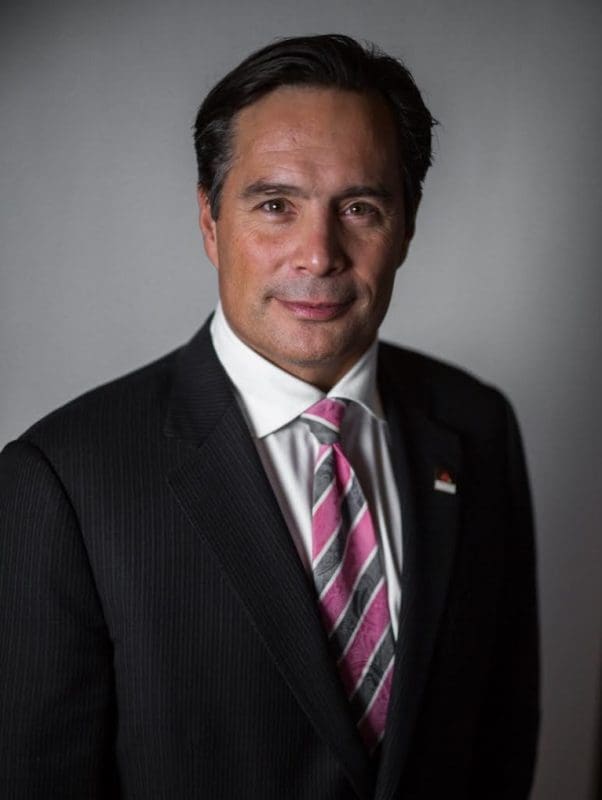
Keith Henry
President & CEO, Indigenous Tourism Association of Canada
The travel industry plays a key role to combat racism. We all have a role to play so ask yourselves what Indigenous involvement are we supporting? Do we know the local Indigenous community/territory, do we support recognizing local Indigenous protocols in any way, do we have Indigenous tourism industry partners, are we supporting the purchases of local authentic Indigenous art, do we market or promote Indigenous experiences in a respectful way, do we have Indigenous staff working in our business, do we include Indigenous tourism industry involved representatives on our board?"
For Keith Henry, President & Chief Executive Officer of the Indigenous Tourism Association of Canada, those are a number of the important questions to consider — and getting clear and tangible answers will be critical to breaking down Indigenous systemic racism.
In order to work toward a more inclusive environment within the industry, Henry believes it’s key to have strong Indigenous tourism industry partners at all levels of advocacy, industry governance, destination marketing and development.
“We need to celebrate Canada as an world leading Indigenous destination,” he says. “It is important to get involved, become a member of the Indigenous Tourism Association of Canada, sign up for email information updates, get involved with the Provincial/Territorial Indigenous tourism associations and attend Indigenous industry led conferences and meetings when available. The future of tourism requires strong partnership within the industry and ITAC is there to guide and support effective relationships.”
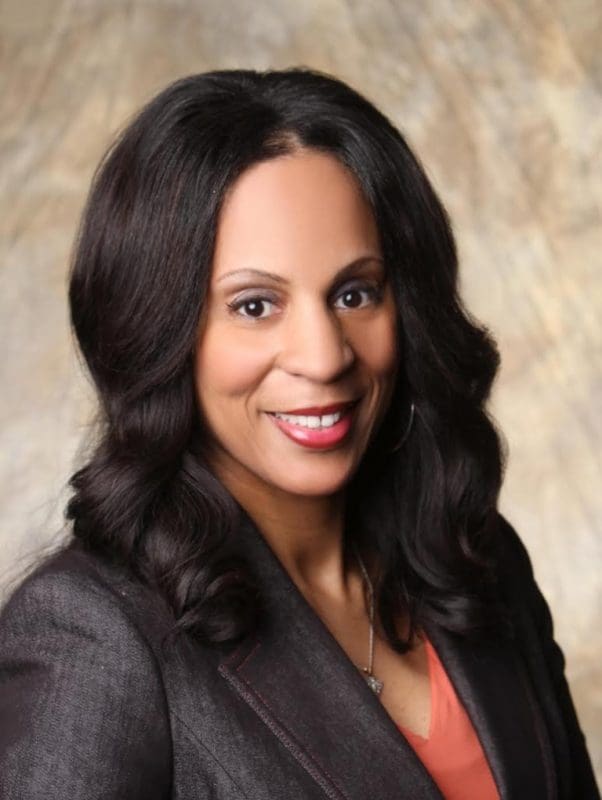
Connie Kinnard
Vice President, Multicultural Tourism & Development, Greater Miami CVB
Acknowledging that racism exists is the starting point to a more inclusive travel industry, suggests Connie Kinnard, Vice President, Multicultural Tourism & Development, Greater Miami CVB.
“There are many people that don’t believe that racism is real because they may not have experienced it,” Kinnard tells Travel Courier. “In the travel industry there have been systemic issues as well; whether we look at history when people of colour were not allowed to stay in certain types of hotels — to current day where in many travel & tourism organizations, there is a lack of diversity in senior leadership.”
Kinnard believes those in key leadership positions should do an open and honest assessment of the areas that they can affect change within their sphere of influence.
“Determine the gaps in your travel business or agency, hotel, DMO etc. and be willing to implement systems that will create opportunities for people of colour that are equitable and promote growth,” she says. “Whether you have the capacity to effect change in hiring or the capacity of expanding sales & marketing directives to focus on diverse markets; genuine efforts to do so are functions that the industry can adopt as part of their normal practice. Racism has so many facets, but one of the inequities that comes from racism is the economic and opportunity deficit.”
She says the travel industry should be proactive in opening doors of opportunity and access to any one, regardless of race, creed or colour.
“People of colour have always been the backbone of the hospitality, tourism & travel industry, so steps towards breaking down those walls of racism that have kept so many people of colour away from the proverbial table is a great start,” she says.
In order to take a more active role against racism, those in the travel industry can start by taking a stand.
“It sounds simple but in fact taking a stand is difficult for some. As travel and hospitality leaders, we have the privilege of interacting with people from various cultures and backgrounds. As we meet people and greet people from all walks of life, we have the unique opportunity to encourage dialogue and seed thoughts of unity and acceptance of all races and cultures.”
Overall, she believes travel is an equalizer and unifier, but points out that staying silent is not enough.
“When we cross borders into countries or even a different neighbourhood in our own community, our perspective is widened, and our hearts are softened. Travel is a connector of interests and experiences,” she continues. “The simple function of treating others like you want to be treated and respecting everyone regardless of skin colour is a good start. A bolder way to take a stand is to be a supporter of anti-racism and not simply claim to be non-racist. Not engaging in racist behaviour is not enough if you are silent when you see or hear discriminatory behaviour from an organization or individual.”
Although the travel industry is wonderful and an economic driver worldwide, she says those in it have to be willing to stand up when wrongful practices are being committed against people of colour, regardless of the possible economic outcome.
“It has to be about humanity – it’s the right thing to do,” she stresses. “One of my favourite Martin Luther King Jr. quotes is as follows: ‘There comes a time when one must take a position that is neither safe, nor politic, nor popular, but he must take it because conscience tells him it is right.’”
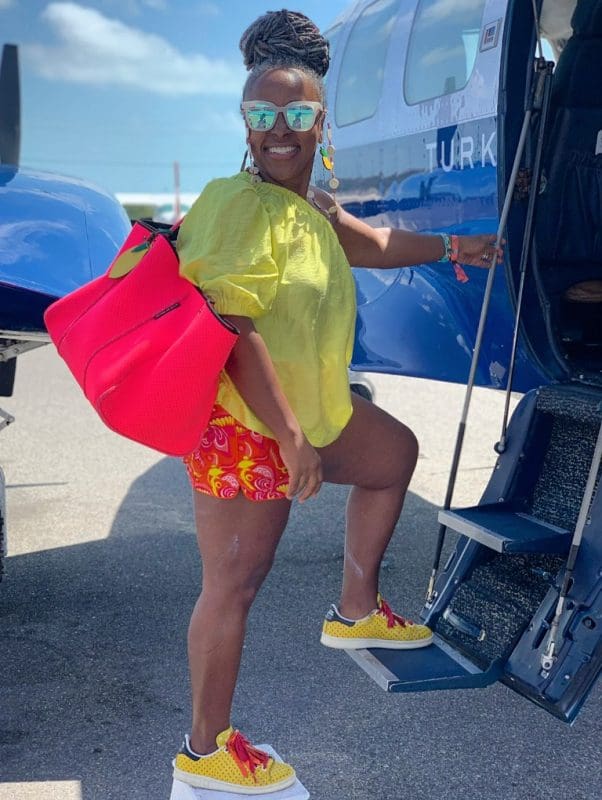
Sarah Greaves-Gabbadon
Travel writer and host, @JetSetSarah
One of the most important things travel companies and destinations can do to be more inclusive of Black travellers and people of colour is to include us in your marketing materials. Are there Black people or BIPOC on websites or social media feeds? Are they featured as guests or as tourism workers? Can you count them on one hand? Representation matters! People want to see people they can relate to, people who look like they do, in your destination and at your resort. And not just during Black History Month!"
As a Black travel writer, Sarah Greaves-Gabbadon (a.k.a. JetSetSarah) says she’s almost always the only POC on a press trip.
“And if I happen to be on a trip that includes a particular Black male journalist who shares my beat, people will always assume that we’re married,” she says. “God forbid we could both simply be professionals doing our job with no relation to each other!”
While on assignment in the Caribbean, the travel writer who has penned pieces for the likes of Travel + Leisure, Brides, Martha Stewart Weddings, The Telegraph, and serves as a brand ambassador for O, The Oprah Magazine!, says all too often other travellers will presume she’s not a guest.
“Regardless of how I’m dressed, guests will often presume I’m a member of staff and ask me for directions or to fetch them something,” she tells Travel Courier. “And it still surprises me how surprised other (White) passengers appear to be when I’m seated in business or first class.”
She says one of the most important things travel companies and destinations can do to be more inclusive is to include Black travellers and people of colour in marketing materials.
“Are there Black people or BIPOC on websites or social media feeds? Are they featured as guests or as tourism workers? Can you count them on one hand? Representation matters! People want to see people they can relate to, people who look like they do, in your destination and at your resort. And not just during Black History Month!”
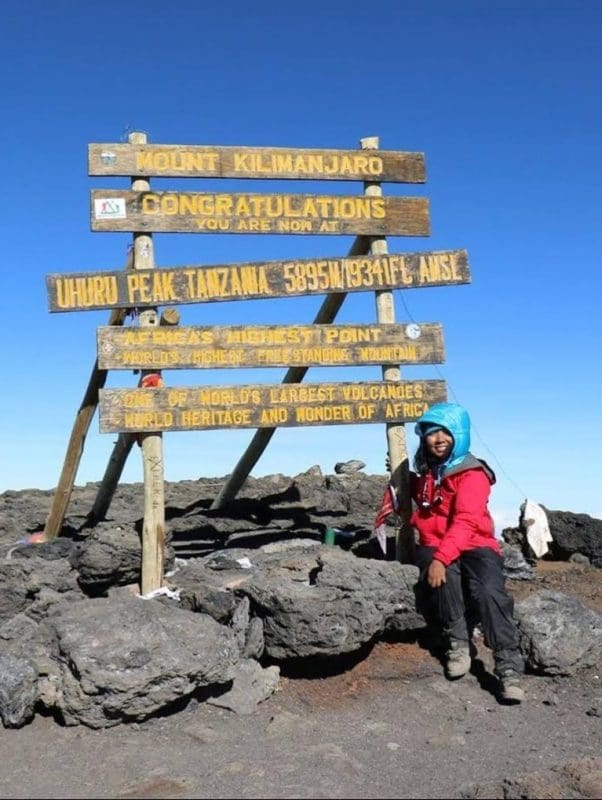
Chun Wright
Principal, Law Office of Chun T. Wright, PLLC / Adventure Travel Trade Association Advisor
Inclusion and diversity are strong values in the adventure travel industry and we must do better to ensure that our industry, at all levels, reflects those values. Too often, diversity and inclusion translates into the diversity of destinations or cultures that we visit rather than among our leadership, customers, and supply chain."
Adventure Travel Trade Association advisor Chun Wright, Principal, Law Office of Chun T. Wright, PLLC, has outlined concrete steps that travel industry members can take to be more inclusive:
1) recognizing racism
2) creating an anti-racism plan
3) promoting conversation on race and racism
4) diversifying staff, especially at leadership levels, and diversifying company vendors by actively seeking them out through bids and other means
5) supporting BIPOC travel companies
6) ensuring BIPOC representation at conferences and trade shows as attendees, speakers, vendors, and media
7) engaging in philanthropy and youth development programs aimed at the BIPOC community to support BIPOC leaders of the future in the travel industry
8) ensuring that our marketing materials and storytelling reflect BIPOC travellers
9) actively marketing to BIPOC customers and listening to their travel needs
10) inviting BIPOC media on familiarization and other trips on a consistent and regular basis.
“These are just some of the many steps we can take,” Wright tells Travel Courier. “Inclusion and diversity are strong values in the adventure travel industry and we must do better to ensure that our industry, at all levels, reflects those values. Too often, diversity and inclusion translates into the diversity of destinations or cultures that we visit rather than among our leadership, customers, and supply chain. We are committed to changing that. As difficult as the past few months have been for the industry as a result of the pandemic, the silver lining is that we have an unprecedented opportunity to transform adventure travel and create a new and inclusive model for the future.”
In order to drive change, she says travel leaders must recognize the problem, even in their own industry, and go beyond the obvious instances of racism to fight systemic racism.
“Systemic racism is a chronic condition that often hides in the shadows unlike overt racism,” she points out.
For this reason, ATTA recently issued an Editorial Statement against Racism and Discrimination, outlining how the organization stands against racism and discrimination in all forms, both individual and systemic, and supports Black Lives Matter.
“Like most complex and deeply rooted problems, we must educate ourselves on the issues and assess our own organizations and biases. We have to clean up our own houses. We can do that by listening, learning from others including our team members and hiring advisors who can help us understand and think through the myriad issues,” she continues. “Third, we can take our learnings and create a diversity and anti-racist plan, with the help of experts, on meaningful steps toward long term systemic change versus cosmetic steps.”
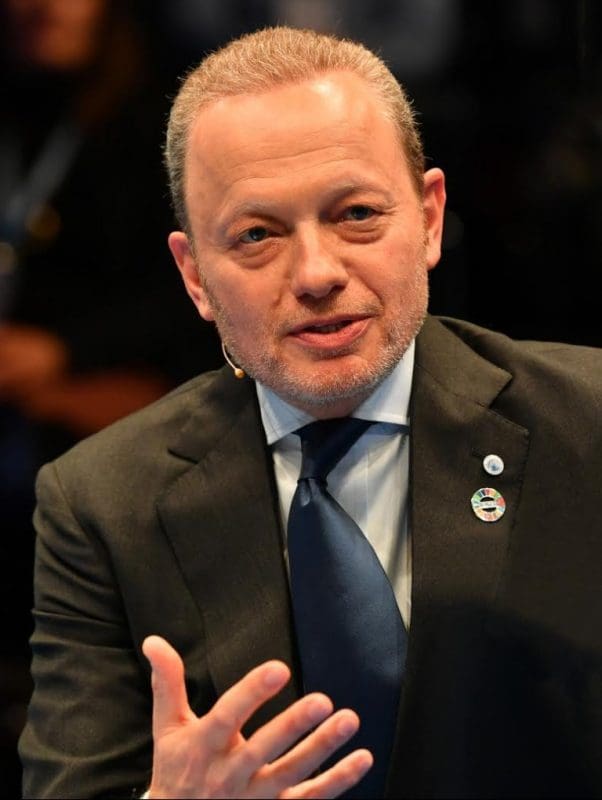
Brett Tollman
Chief executive, The Travel Corporation
The Travel Corporation’s Chief Executive Brett Tollman says there is much more those in the travel industry need to do to actively fight racism.
We can do more to engage with and support members of BIPOC in our local communities and in the destinations where we operate and bring travellers to,” Tollman tells Travel Courier. “We can and need to work harder to recruit and retain, wherever possible, more BIPOC members. We can help be a voice and a funnel for our guests and social media communities about the issues of racism and help change the dialogue.”
He says TTC doesn’t and won’t tolerate racism and sees travel as one of its most effective cures.
“This informs the work we do, bringing people and cultures around the world together to build bridges of discovery and understanding,” he continues. “In addition to shaping the ways we travel, this view shapes our daily practices: Now, and always, we stand united in support of diversity, inclusivity, and equality. However, in light of the recent heartbreaking events, we humbly acknowledge that we can all do better and must take action today through our collective efforts.”
Most importantly, Tollman says people need to stay educated about the issues the BIPOC community faces.
“TTC offers diversity and inclusion training for every team member we hire to ensure we are all informed across the globe,” he says. “Action and dialogue must be a priority in order to fight racism and inequality in the industry and beyond. To quote Nelson Mandela – ‘People must learn to hate, and if they can learn to hate, they can be taught to love, for love comes more naturally to the human heart than its opposite…’”
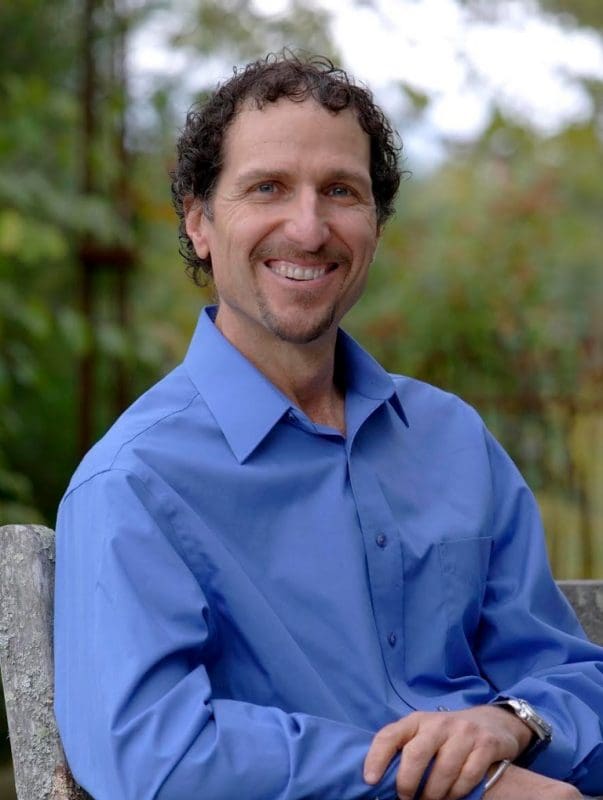
Costas Christ
Founder of Beyond Green Travel, an entity of Preferred Hotel Group, Inc.
As the travel industry celebrates experiencing and learning about other cultures and ways of life, Costas Christ, Founder of Beyond Green Travel, an entity of Preferred Hotel Group, Inc., believes it should be at the forefront in fighting racism.
Provide staff training on understanding racism, ensure nondiscrimination in the workplace and have independent and unbiased company grievance procedures in place to address any discrimination complaints, and ensure upward career mobility without any regard to gender, race or ethnic affiliation,” he notes.
In order to take a stand against racism, he says those in the travel industry should openly and clearly condemn racism in all of its manifestations.
“Sustainable Tourism best practice has at its core the social and economic wellbeing of all people and racism is antithetical to that,” he says.

















